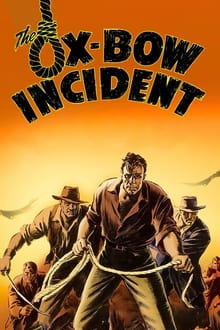
There can't be any such thing as civilisation unless people have a conscience.
The Ox-Bow Incident is directed by William A. Wellman and adapted to screenplay by Lomar Trotti from the novel of the same name written by Walter Van Tilburg Clark. It stars Henry Fonda, Henry Morgan, Dana Andrews, Mary Beth Hughes, Anthony Quinn, William Eythe and Jane Darwell. Music is scored by Cyril J. Mockridge and cinematography by Arthur C. Miller.
Gil Carter & Art Croft ride into the town of Bridger's Wells, they hit the local saloon to imbibe after a log hard cattle drive. Whilst there a man runs in and announces that a popular man from the town has been shot by rustlers. The sheriff is out of town and a lynch mob quickly forms to bring what they see as swift justice to the culprits, Gil & Art join the posse so as to make sure they themselves don't get blamed for the shooting. The posse finds three weary workers and convince the majority that these guys are guilty and that instant hanging is the only way to do things. There are, however, one or two dissenting voices......
What a fabulous movie this is, a powerful indictment of how the lynch mob mentality can grip and lead to pain for many. William Wellman directs superbly, with a big ensemble in such a small area (Ox-Bow), he manages to get the right blend of emotive reactions from the leading players. Henry Fonda as Gill Carter is perfectly sedate and compassionate, even though he is far from being a flawless character, Dana Andrews as Donald Martin is heart achingly real, while others like Frank Conroy as Major Tetley are suitably full of ignorant bluster. It's quite an experience to see Wellman pull them all together with so much style. The photography from Miller is excellent, shadowy low tone black and white that is in keeping with the downbeat nature of the film, it infuses the picture with a gritty hard bitten noirish look. While Mockridge scores it suitably as sombre.
Ultimately it's the story that triumphs the most, claustrophobic in nature, it is simple yet tragic as it spins out to tell us how a group of seemingly sane individuals turned out to be a mass of incoherent reasoning. When a letter is read out during the finale, it is devastating in its effect, we see men broken, heads bowed in shame, others heavy in heart, their lives never to be the same. The emotional whack is hard hitting, and rightly so. For this is unashamedly a message movie, and a worthy one at that, so much so its reputation has grown over the years, where both the film and novel have made it into some educational curriculum's. It's very much a landmark Western, by choosing to forgo action for dark characterisations, it opened up the Western genre to being more than just shoot-outs and trail blazing. Had it been made seven or eight years later I think it would have garnered higher critical praise.
In spite of being one of Fonda's favourite movies that he made, the film didn't make money. The public were not quite ready for such sombre beats (Orson Welles, tellingly I feel, loved it), the critics of the time were irked by Wellman's decision to film the key trial and lynching sequences on the stage. Yet the closeness this gives the narrative serves it well, thrusting the many characters close together so they, and us, can see the whites of everyone's eyes, this is about focusing on the faces of those about to commit a capital crime. The close confines also gives off a pervasive sense of doom, where pessimism seeps through, there is no short changing here, the makers are dealing in bleakness and the right choices are made to produce one of the finest and most upsetting exponents of mob mentality played out on film. 9/10